The Intel Kaby Lake-X i7 7740X and i5 7640X Review: The New Single-Threaded Champion, OC to 5GHz
by Ian Cutress on July 24, 2017 8:30 AM EST- Posted in
- CPUs
- Intel
- Kaby Lake
- X299
- Basin Falls
- Kaby Lake-X
- i7-7740X
- i5-7640X
Benchmarking Performance: CPU Encoding Tests
One of the interesting elements on modern processors is encoding performance. This includes encryption/decryption, as well as video transcoding from one video format to another. In the encrypt/decrypt scenario, this remains pertinent to on-the-fly encryption of sensitive data - a process by which more modern devices are leaning to for software security. Video transcoding as a tool to adjust the quality, file size and resolution of a video file has boomed in recent years, such as providing the optimum video for devices before consumption, or for game streamers who are wanting to upload the output from their video camera in real-time. As we move into live 3D video, this task will only get more strenuous, and it turns out that the performance of certain algorithms is a function of the input/output of the content.
All of our benchmark results can also be found in our benchmark engine, Bench.
7-Zip 9.2: link
One of the freeware compression tools that offers good scaling performance between processors is 7-Zip. It runs under an open-source licence, is fast, and easy to use tool for power users. We run the benchmark mode via the command line for four loops and take the output score.
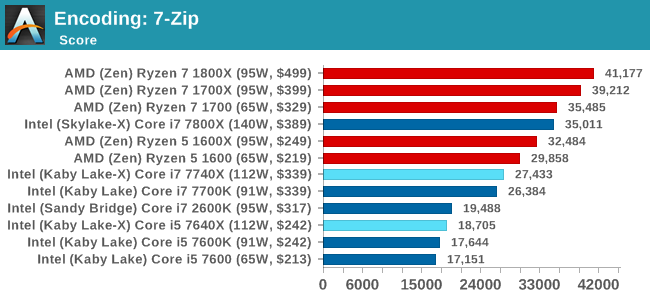
7z loves threads. 7z loves it.
WinRAR 5.40: link
For the 2017 test suite, we move to the latest version of WinRAR in our compression test. WinRAR in some quarters is more user-friendly that 7-Zip, hence its inclusion. Rather than use a benchmark mode as we did with 7-Zip, here we take a set of files representative of a generic stack (33 video files in 1.37 GB, 2834 smaller website files in 370 folders in 150 MB) of compressible and incompressible formats. The results shown are the time taken to encode the file. Due to DRAM caching, we run the test 10 times and take the average of the last five runs when the benchmark is in a steady state.
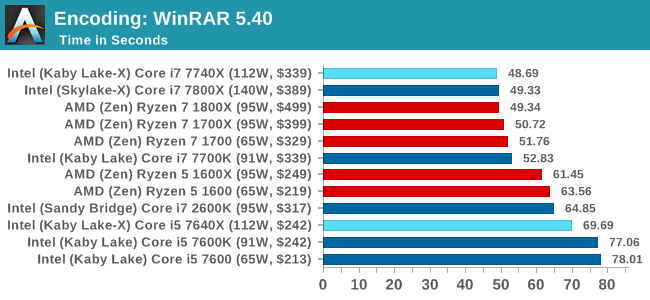
WinRAR is another benchmark like Agisoft, with some parts being serial and others multithreaded. When we compare the Core i7 to the Ryzen 7, the high ST performance helps push the Core i7 to the top despite the 2:1 thread deficit. On the other hand, the Core i5 has a 3:1 thread defecit to the Ryzen 5, and falls beneath it in the results.
AES Encoding
Algorithms using AES coding have spread far and wide as a ubiquitous tool for encryption. Again, this is another CPU limited test, and modern CPUs have special AES pathways to accelerate their performance. We often see scaling in both frequency and cores with this benchmark. We use the latest version of TrueCrypt and run its benchmark mode over 1GB of in-DRAM data. Results shown are the GB/s average of encryption and decryption.
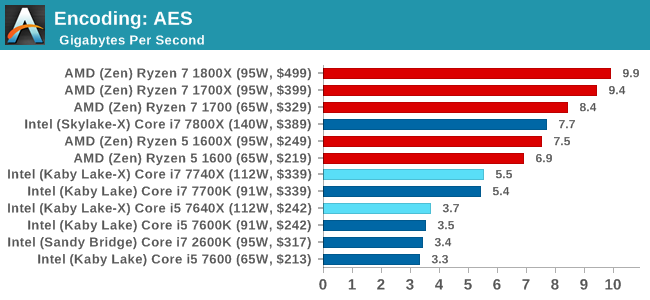
AES is an optimized problem for modern processors, so add frequency and cores to get a proportionally better result. Again, the Core i7-2600K and the Core i5-7640X are almost neck-and-neck.
HandBrake v1.0.2 H264 and HEVC: link
As mentioned above, video transcoding (both encode and decode) is a hot topic in performance metrics as more and more content is being created. First consideration is the standard in which the video is encoded, which can be lossless or lossy, trade performance for file-size, trade quality for file-size, or all of the above can increase encoding rates to help accelerate decoding rates. Alongside Google's favorite codec, VP9, there are two others that are taking hold: H264, the older codec, is practically everywhere and is designed to be optimized for 1080p video, and HEVC (or H265) that is aimed to provide the same quality as H264 but at a lower file-size (or better quality for the same size). HEVC is important as 4K is streamed over the air, meaning less bits need to be transferred for the same quality content.
Handbrake is a favored tool for transcoding, and so our test regime takes care of three areas.
Low Quality/Resolution H264: He we transcode a 640x266 H264 rip of a 2 hour film, and change the encoding from Main profile to High profile, using the very-fast preset.
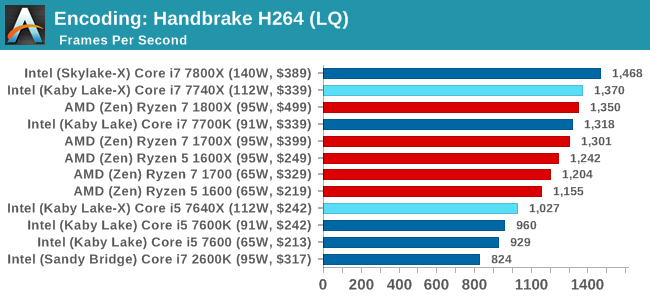
High Quality/Resolution H264: A similar test, but this time we take a ten-minute double 4K (3840x4320) file running at 60 Hz and transcode from Main to High, using the very-fast preset.
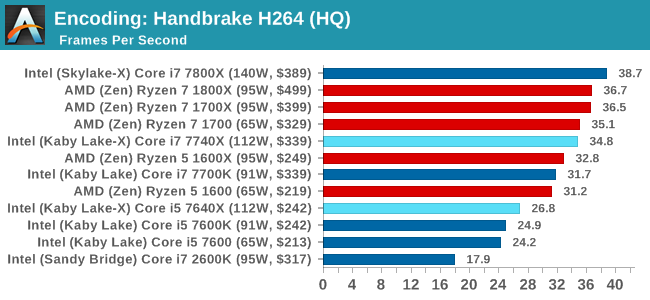
HEVC Test: Using the same video in HQ, we change the resolution and codec of the original video from 4K60 in H264 into 4K60 HEVC.
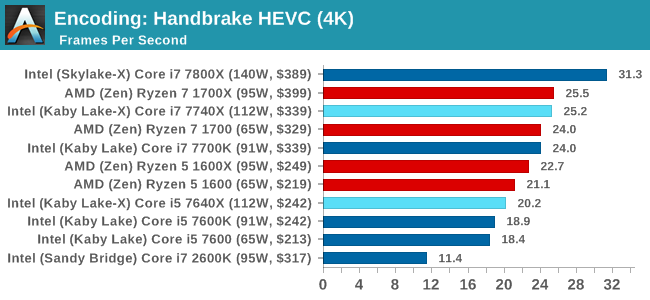










176 Comments
View All Comments
MrSpadge - Monday, July 24, 2017 - link
> realize that overclocking may not be appropriate for these workloadsThat's going too far. Just don't overclock as far for heavy AVX usage.
MrSpadge - Monday, July 24, 2017 - link
Kind of agreed. Ian, you should log the clock speeds during benchmark runs and check for anomalies. The chip or mainboard could throttle, or your 4.0 GHz AVX clock could just be way too low. What's the default AVX clock? Maybe 4.4 GHz? That would pretty much match the 10% performance degradation.Ian Cutress - Monday, July 24, 2017 - link
I need to do a performance scaling piece, I know. It's on the to-do listKvaern1 - Monday, July 24, 2017 - link
As already mentioned it's heavy AVX workloads which makes it throttle when OC'ed. The same thing happens on OC'ed Skylakes.arh2o - Monday, July 24, 2017 - link
Something seems wrong with the 7700k results vs the 7600k results. How is the 7600k beating the 7700k so handily in all the games? Are you sure the graphs are not swapped? ROTR shows the 7600k beating the 7700k by 20 FPS which seems impossible considering most reviews on this game have the 7700k on top of the 7600k.ydeer - Monday, July 24, 2017 - link
I would have liked to see some idle power consumption numbers because my PC is always on.Ro_Ja - Monday, July 24, 2017 - link
This was an interesting read. Thank you!Marnox - Monday, July 24, 2017 - link
According to Intel (https://ark.intel.com/products/97129/Intel-Core-i7... the Turbo speed for the 7700K is the same as the 7740X.mapesdhs - Monday, July 24, 2017 - link
Is the Max Turbo for one core or two? Always bugged me that Intel doesn't list the individual core/bin levels.versesuvius - Monday, July 24, 2017 - link
It will be interesting to see how many of these CPUs Intel will actually produce (collect ?) and bring to the market.